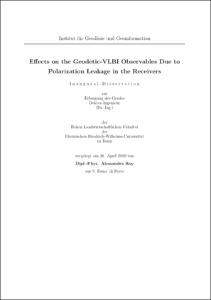Effects on the Geodetic-VLBI Observables Due to Polarization Leakage in the Receivers

Effects on the Geodetic-VLBI Observables Due to Polarization Leakage in the Receivers

| dc.contributor.advisor | Nothnagel, Axel | |
| dc.contributor.author | Roy, Alessandra | |
| dc.date.accessioned | 2020-04-14T08:52:46Z | |
| dc.date.available | 2020-04-14T08:52:46Z | |
| dc.date.issued | 01.07.2010 | |
| dc.identifier.uri | https://hdl.handle.net/20.500.11811/4213 | |
| dc.description.abstract | Geodetic VLBI delivers baseline length and Earth orientation parameter measurements, which offer the most viable and precise way to study Earth crustal and core dynamics and to support space navigation. The precision of these geodetic and astrometric measurements is degraded by instrumental errors of which polarization leakage is one of the larger. Its effect can be corrected in the data provided one knows the leakage characteristics of the stations. In this work I introduce the concept of polarization, why it needs to be considered in the geodetic analysis and present a VLBI experiment that measured the polarization leakage at 16 geodetic and VLBA stations over the frequency range 8212.99 MHz to 8932.99 MHz and 2225.99 MHz to 2365.99 MHz. I describe resulting polarization leakage measurements and the algorithm that was implemented to correct for their effect on the geodetic delay measurables. I applied the correction for polarization leakage to a routine geodetic VLBI experiment and check for the resulting improvement. From the measured leakage terms, one would expect polarization leakage to affect the group delay measurements by 0.5 ps to 7 ps, depending on the stations involved in the baseline. This proved to be below the statistical noise in a single VLBI experiment and so the improvement from the correction could not be detected. Polarization leakage was found, unespectedly, not the dominant source of non-closing errors. | |
| dc.description.abstract | Die durch geodätisches VLBI ermittelten Basislinenl¨angen und Erdrotationsparameter bieten die praeziseste Methode, Erdkrusten- und Kerndynamik zu studieren und Weltraumnavigation zu unterstützen. Polarisationsverluste gehören zu den instrumentellen Störungen, die die Präzision der geodätischen und astrometrischen Messungen verringern. Ihr Effekt kann in den Daten korrigiert werden, vorausgesetzt man kennt die Verlust-Charakteristika. In dieser Arbeit stelle ich kurz das Konzept der Polarisation vor und warum sie in der geodätischen Analyse berücksichtigt werden muss. Ich stelle RD0705 vor, ein Projekt zur Messung der Polarisationsverluste an einigen geodätischen VLBI Stationen und am VLBA. Ich beschreibe die Beobachtungsstrategie, die verwendet wird, um die Verluste zu messen, den Prozess der Korrelation, die Datenreduktion und die erzielten Ergebnisse. | |
| dc.language.iso | eng | |
| dc.relation.ispartofseries | Schriftenreihe / Institut für Geodäsie und Geoinformation ; 20 | |
| dc.rights | In Copyright | |
| dc.rights.uri | http://rightsstatements.org/vocab/InC/1.0/ | |
| dc.subject | Agriculture | |
| dc.subject | VLBI | |
| dc.subject | Polarisation | |
| dc.subject | Optischer Verlust | |
| dc.subject | Leckage-Messung | |
| dc.subject | Geodetic VLBI | |
| dc.subject | Polarimetry | |
| dc.subject | Delay | |
| dc.subject | Astrometry | |
| dc.subject.ddc | 550 Geowissenschaften | |
| dc.title | Effects on the Geodetic-VLBI Observables Due to Polarization Leakage in the Receivers | |
| dc.type | Dissertation oder Habilitation | |
| dc.publisher.name | Universitäts- und Landesbibliothek Bonn | |
| dc.publisher.location | Bonn | |
| dc.rights.accessRights | openAccess | |
| dc.identifier.urn | https://nbn-resolving.org/urn:nbn:de:hbz:5N-21896 | |
| ulbbn.pubtype | Erstveröffentlichung | |
| ulbbn.birthname | Bertarini | |
| ulbbnediss.affiliation.name | Rheinische Friedrich-Wilhelms-Universität Bonn | |
| ulbbnediss.affiliation.location | Bonn | |
| ulbbnediss.thesis.level | Dissertation | |
| ulbbnediss.dissID | 2189 | |
| ulbbnediss.date.accepted | 07.06.2010 | |
| ulbbnediss.institute | Landwirtschaftliche Fakultät : Institut für Geodäsie und Geoinformation (IGG) | |
| ulbbnediss.fakultaet | Landwirtschaftliche Fakultät | |
| dc.contributor.coReferee | Kuhlmann, Heiner |
Dateien zu dieser Ressource
Das Dokument erscheint in:
-
E-Dissertationen (1027)




